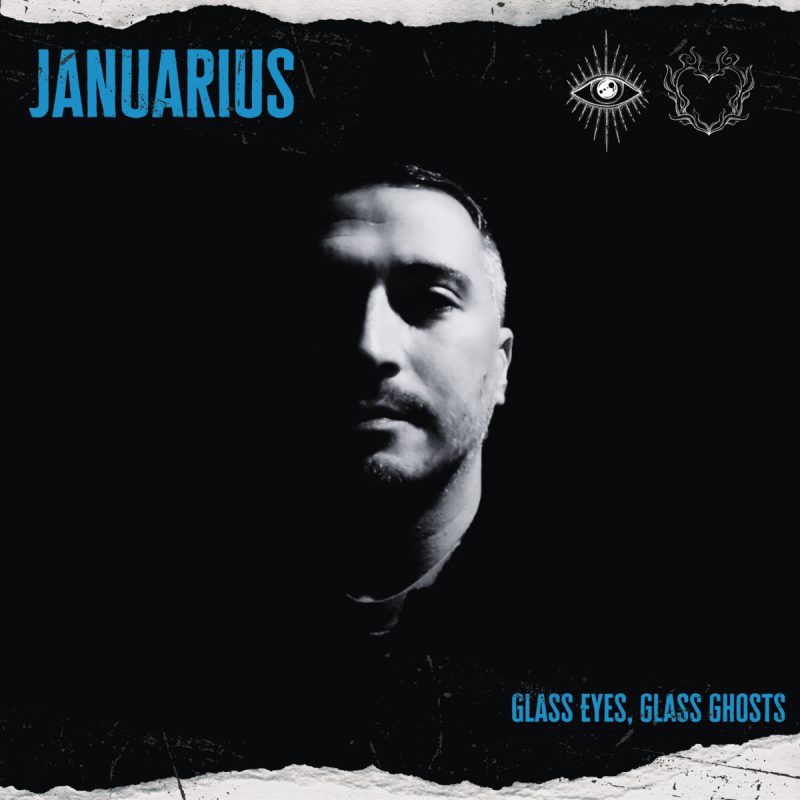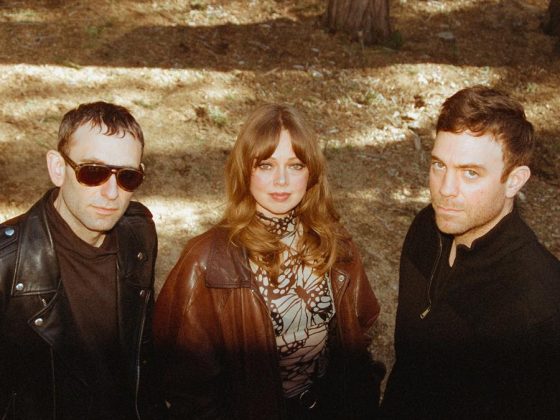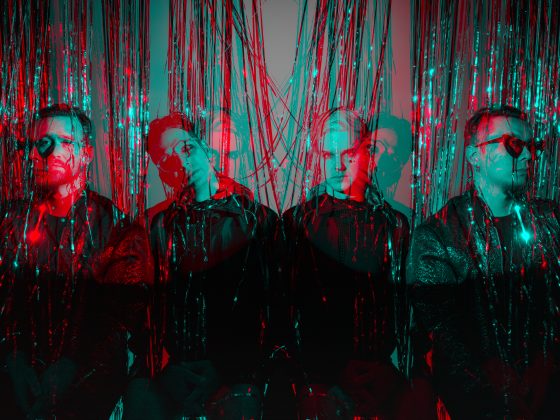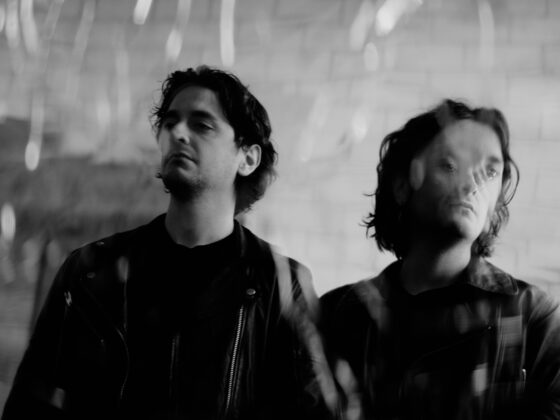Glass eyes, content with their darkness,
cast off the fire we harnessed.
Though we’re worlds apart, the wire’s stripped bare.
Could we save a spark from your electric chair?
Since the early 2000s, Januarius has cut a jagged path through DC’s restless underbelly, leaving sonic fingerprints on bands like The Chance, The Mirror Script, and Ghost Light. But it was Philadelphia’s South Street – equal parts decay and delight – that cracked something open. A chaotic corridor of punk apparel, basement gigs, and record bins steeped in static, it offered a rawer catechism than classroom or chapel ever could. The Trocadero’s fading glamour, the screech of stacked amps, the righteous clutter of DIY culture: here, Januarius found not answers, but the right kind of noise. Trading punk’s posture for post-punk’s atmosphere, they dove headlong into lo-fi liberation, chasing the hiss between heartbeats. Their ethos is neither nostalgic nor doctrinaire; it’s a rejection of rigidity in favour of disorder, dissonance, and the disciplined art of coming undone. For Januarius, punk was never about playing by the book, it was about tearing out the pages.
With a sound described as a “lo-fi fever dream,” Januarius’ music accentuates the beauty in the bizarre by crafting hypnotic yet hook-laden songs that seamlessly meld post-punk, darkwave, shoegaze, and no wave with traditional songwriting prowess. His signature cold baritone is accompanied by a palette of guitar, brooding synthesizers, drones, and somber but mellifluent hooks that envelop the listener. The influence of iconoclastic artists like Greg Sage, Sonic Youth, Iggy Pop, Mark Lanegan, Nico, and Glenn Branca are prevalent.
“My main creative influence has always been Philadelphia,” he reflects. “I grew up in an era of urban blight, which forced me to look at the world differently and find beauty in places where one wouldn’t typically experience it…I’ve always felt like a perpetual outsider my whole life and can be rather misanthropic in terms of my hopes for humanity…Whether it was growing up gay and artistically minded in a tough working-class urban area, not fitting in with the DC music scene, or despising the soulless pablum of the modern LGBT world, I’ve always been on the outside. Never blend in.”
Now, Januarius unleashes a breathtaking debut LP, Glass Eyes, Glass Ghosts.
The album opens with Sepulchres, a dirge of devotion steeped in spectral weight. Atmospheric drums and a classic post-punk bassline give form to its funeral procession, while crooned vocals, half-formed, half-forgotten, drift like incense from the threshold between worlds. Horn-like synths and mournful guitars deepen the gloom. It’s a lament in ritual form: tombs, phosphenes, and midnight voyages conjure a dreamscape where love lingers in opium smoke and echo. A Wishbone in the Rye follows, a sorrowed salute to the fragile hopes of youth. Nodding to Salinger, the track wades through dreamlike decay: wishes turned to wreckage, drowning in the undertow of failed expectation. Synths sigh, chords stretch and blur, guitars creep in like dusk. The vocals float, distant but full of fractured wonder, swelling into a chorus that drifts like a phantom just out of reach. With wishbones, shattered glass, and thorns as relics, the song cradles its despair in beauty.
Fragments is a fevered elegy, a slow unraveling of love curdled by time and silence. The lyrics bloom with images of blood roses, broken vows, and eyes drained of light—each line steeped in sorrow, echo, and spectral ache. Love, once exalted, decays into delirium, marked by ghostly whispers and the cold hush of regret. Opening with a western twang and jazzy strumming, the song quickly stretches skyward—starlit synths and poetic vocals giving it a cosmic hue. Rave On spins like a carousel adrift in fog, where neon hearts trace circuits of memory and illusion. Once-vivid dreams dissolve into silhouettes, and moonlit goodbyes replace declarations. The music shifts into a gentle, glistening sway, with buoyant guitars and a bassline recalling early Cure or 4AD’s golden age. There’s warmth here too; a sunlit memory of summers past. The guitar solo glides and coils with quiet brilliance, hypnotic in its ascent and descent.
Glass Eyes, Glass Ghosts opens with the classic post-punk bassline, haunted guitar riffs, layered with eerie riffs, and vocals that feel like a character from a gothic novel haunting a castle. The guitar transitions to heavier, alt-rock shoegaze with the chorus, while he sings the morbid lyrics. A surreal lament of disconnection and decay, the song evokes a world of synthetic vision and shattered emotion. Glass eyes and ghosts haunt fractured connections, where love once sparked but now lies dormant.
Do You Remember Blue drifts through skies painted in gold and sorrow, where love once bloomed like a rose beneath a universe of color. The question lingers like mist at day’s end: does beauty fade, or does it live on in the echoes of someone who once knew how to sing in blue? It’s the sound of a record being put on, a classic drum machine sound. Lo-fi nostalgia with the guitar riff and psychedelic effects, as well as the bassline. The song makes its poetic argument effectively. Wistful and melancholic, but dreamy and hopeful.
A voice once divine turns venomous, unraveling into delusion and betrayal in Strange Illusions. The song opens with vocal samples that sound like a speech, then old-school horn-like organ synths, guitar riffs strumming, and haunted vocals: a poetic dirge. It transitions into distorted guitars, delivering deep emotional intensity through immersive lyrics. The song unfolds as an emotionally charged narrative, tracing the severing of ties through silence, vengeance, and fire. Illusions are shattered, curses invoked, and memories burned. Liberation rises not with forgiveness, but fury: casting off deception, reclaiming power, and walking away from love’s ashes with eyes wide and heart sealed.
Burn The Poison howls with righteous fury, calling for the collapse of a corrupt spectacle built on betrayal and bloodlust. A world drunk on illusion staggers toward ruin, where wolves lull victims to sleep and beauty masks the blade. Quite a different song from the rest of the album, with psychedelic discord, very distant vocals behind the bouncy weird phasing guitar effects that sound like post-punk and gothic rock underwater, which transitions to shoegaze…it feels like Brendan Perry from early Dead Can Dance conjuring a fever dream.
The final track, Fragments Reprise, is an eerie, sadder waltz-like version of the opening track, a beautiful way to close the album.
Listen to Glass Eyes, Glass Ghosts below and order the album here.
Produced independently and recorded without regard for technical convention, Januarius sees his music as a call for individuality in an age of alienation and conformity. The enigmatic multi-instrumentalist and songwriter hails from Philadelphia, PA and currently resides in Washington, DC.
Januarius spoke with Post-Punk.com about the album, some tech talk, and his songwriting process:
The title track, “Glass Eyes, Glass Ghosts,” presents haunting imagery. What inspired the themes and symbolism in this song?
“Glass Eyes, Glass Ghosts” was my socio-political critique of modern life. Essentially, it’s a metaphor for being willfully blind and soulless, and how that creates a frivolous and self destructive world. This theme runs through much of the album.
Your vocals often carry a haunting, ethereal quality. Can you discuss the specific vocal effects or processing techniques you employed to achieve this sound?
I think some of it is just the nature of my voice. My singing carries with it a sense of despair or longing that gives the songs a very particular color. As far as production techniques, I always apply some reverb and echo on my voice, but I occasionally do unorthodox things like sing through a paper towel roll or export a vocal track into my phone and then rerecord it by playing it from the phone into my guitar pickup.
The guitar work on the album ranges from melancholic strumming to more aggressive shoegaze elements. What types of guitars and amplifiers did you use to capture this diverse tonal palette?
My main guitars are a Gibson SG Special (a tribute to Greg Sage of the Wipers) and a Fender Thinline Telecaster. They have complimentary sounds that blend together very well, so I tend to use both on each track to create a polyphonic atmosphere. My go to amplifier has always been a Fender Vibraverb,
An unusual discordant or minimalist use of Effects pedals seem to play a significant role in shaping the album’s atmosphere. Are there particular pedals or signal chains that were instrumental in crafting your signature sound? Or Is the sound achieved some other way?
Aside from blending two guitars together, I mostly use only reverb and echo. Some of the more radical sounds came from creating volume swells and drones using an e-bow and a volume pedal. I’d often reverse them during the mixing process to create a weird backwards effect, or blend together 3 drone sounds to create a chord.
In tracks like “Rave On,” the guitar riffs have a mesmerizing, almost hypnotic quality. How did achieve this effect?The vibe and sound of Rave On was achieved not by effects, but by the very softly played counter melodies in the two guitar parts, and the overall recording quality, or lack thereof. There’s virtually no separation of sounds on that song and very little mixing. I wanted that song to sound like a fever dream coming from a transistor radio or small cassette player. The result was a very hypnotic but engrossing song.
Synthesizers and drones add depth to your compositions. Can you elaborate on the electronic instruments or software you incorporated and how they contributed to the overall mood?
The synthesizer is a Roland Juno that was recommended to me by Parker from Profit Prison. I used it largely to create emphasis on the choruses and to create hooks for what I felt were key parts of each song. It really added a new dimension to the songs and brought out a lot of new wave influence in my writing. Listening to the end result, I think the synth is what finalized the signature sound of the album. It would have been a very different album without it.
Are there any films or visual arts that have significantly influenced the aesthetic or storytelling aspects of your music?
David Lynch was always a huge influence on my music. He died while I was finishing the last few songs on the album, and I used that as an impetus to take those songs even further than I originally imagined. In particular “Fragments” and “Glass Eyes, Glass Ghosts” were definitely kicked up a notch as a tribute to him. I tried to make them more abstract and incorporate sections that delved into the subconscious.
Carravaggio is a favorite artist of mine that has greatly influenced my sound. I love the way he blends darkness and light with his chiaroscuro technique. I’ve tried to emulate that with my songs. I think it’s a dark record overall, but there are just enough glimmers of light that pour through at different times to make it interesting.
Growing up in Philadelphia’s South Street scene, how did that environment shape your musical identity and artistic vision?
South Street was incredibly important to me. It was like a fantasy world that existed on the edge of my neighborhood; seemingly out of place yet perfectly logical at the same time. I was exposed to almost everything I know about art, music, literature, philosophy, and life there. In the course of just a few blocks I could hear revolutionary music, read beatnik literature, buy drugs, get accosted by dancing Hare Krishnas, play video games, walk around Colonial era cemeteries, and see live performances of all sorts. I saw bands as diverse as the Jesus Lizard, Sebadoh, and the legendary Joe Strummer all in the same place. Apathy, gentrification, and technology have made those kinds of bohemian environments largely obsolete today. That’s a very sad thing. I hope it changes.
The song “Strange Illusions” delves into themes of memory and perception. What experiences or ideas influenced this track?
Strange Illusions came to me in a dream. It was a stark reminder of someone I was trying to forget. The song became my exorcism of those feelings. The play, Medea, by Euripides figured into the lyrics a bit too. There was a sense of vengeance in the song as in the finale of the play. It was a musical way of burning something to the ground and then flying off victoriously on my golden serpents like Medea.
Can you tell me about the song “Burn the Poison,” and how you came up with it’s distinct sound?
Burn the Poison was written in a radical guitar tuning of my own invention. It’s the only song on the album where I didn’t use the aforementioned guitars. Instead I used a cheap department store guitar with only one pickup to get a really raw sound that complimented the gnarly tuning. The vocals were recorded on an incredibly hot mic that helped achieve the overly distorted sound. The song was my way of lashing out at all of the distortions that exist in modern society. I was essentially saying take everything from TikTok to cable news, politicians, activists, and influencers and burn it all to the ground.
Your lyrics often intertwine themes of decay and beauty. How do you navigate the juxtaposition of these elements in your songwriting?
That’s definitely a major theme in my lyrics and yet another way of emulating the chiaroscuro technique. This is a very dark album, but there’s also an uplifting energy that shines through. I think that originated from growing up in an era of urban blight and decay. I remember walking around graffiti covered buildings, ditches, and empty houses as a kid. Somehow I managed to see a sense of spirit in that. David Lynch said the same thing about living in Philadelphia as an art student and called it his biggest inspiration. I echo this sentiment. Musically speaking, I hope this album conveys that while there is darkness in abundance, the light will always be present somewhere. It takes light to create shadow. They are complimentary, not contradictory.
Follow Januarius:
















 Or via:
Or via: